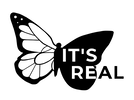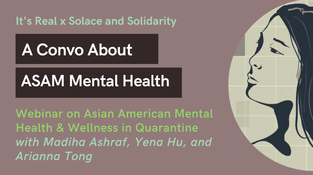IT'S REAL x SOLACE AND SOLIDARITY (may. 2021)
COVID-19 has distanced us from loved ones, kept many isolated in unwanted conditions, and contributed to a terrifying spike in anti-Asian hate crimes. Understandably, many of us are seeking advice and comfort amidst grief and uncertainty.
Moderated by the co-leads of It’s Real and Solace and Solidarity, our ASAM Mental Health Webinar seeks to build community through real-time discussion with expert panelists.
Join us at 11:00 AM PST on Saturday, May 1st to hear from Madiha Ashraf, Yena Hu, and Arianna Tong on coping with isolation, enduring hateful environments, and staying grounded. Our panelists will also touch on the specific fields they hold expertise in, such as domestic violence therapy, toxic relationship behaviors, family trauma, and more.
Recording of the event



